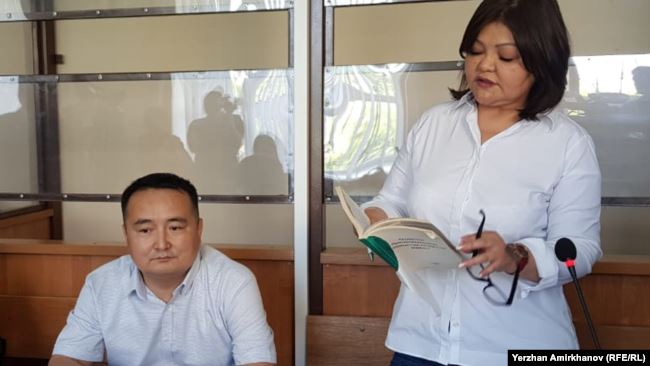
A judge quickly agreed to send the case to Almaty; Serikzhan Bilash is charged with inciting violence against Chinese.
On March 10, Serikzhan Bilash was arrested at around 2:30 in the morning in an Almaty hotel. He was whisked away to Astana (now renamed as Nur-Sultan), to face charges of inciting ethnic discord. He was released shortly thereafter into house arrest, but made to stay in the capital — even though his home was in Almaty.
On July 29, Bilash’s trial began in Nur-Sultan. Bilash’s supporters packed the court. The judge, according to RFE/RL, “quickly ruled that it must continue in Almaty… because that is where Bilash allegedly committed his crime of extremist speech.” Bilash’s lawyer, Aiman Umarova, had petitioned the court to terminate the case, end Bilash’s house arrest and move the case to Almaty. In Almaty, Bilash will remain on house arrest and still face charges.
The core of the state’s case against Bilash rests on its apparent interpretation of a speech he gave in Almaty as inciting “jihad” against Chinese.
Enjoying this article? Click here to subscribe for full access. Just $5 a month.
Umarova told Radio Free Asia that a video of Bilash speaking had been edited to remove critical context and then posted online by Kazakh and Chinese authorities.
“I believe he is innocent, because he said that he would conduct an information jihad against discrimination against Kazakhs, Kyrgyzs, and Uyghurs in China’s ‘re-education’ camps,” Umarova said.
Bilash’s wife Layla told RFA: “The original comments made by Serikzhan weren’t about going to Syria with a machine gun, but about jihad as an information war, a holy war of ideology.”
Chris Rickleton summarized the comments for Eurasianet thusly:
The comments upon which the charge is based were made at a public event in February.
Bilash – not known for being careful with his tongue – called for a “jihad” against the Chinese over their Xinjiang policies during the event.
He then added that this was an injunction to wage an information war rather than a call to violence.
In April 2017, Bilash founded a civil society organization to call attention to the detention of ethnic Kazakhs in Xinjiang by the Chinese government. With a fiery rhetorical style, Bilash served to publicize the issue and gather testimonies from affected families.
Bilash attempted to get his organization, named Atazhurt Eriktileri (Volunteers of the Fatherland) or Atazhurt, registered officially, but was denied multiple times. He was fined in February for running an unregistered organization and shortly thereafter arrested.
Using the broad ambit of Article 174 of the criminal code — which covers incitement of “social, national, tribal, racial, class, or religious” discord — Nur-Sultan has moved to silence the eye of a potentially expansive social storm.
In court during a break, Bilash told reporters (in English) that he was innocent and reiterated his work: “I have been raising the issue of what can be described as genocide against Kazakhs, Uyghurs, and other mainly Turkic people in Xinjiang. Hundreds of thousands of them are being forced into so-called reeducation camps, where they face torture and humiliation.”
Bilash condemned Beijing’s expansionist policies and accused the Kazakh government of doing China’s dirty work, saying that he was being tried by the Chinese authorities via the hands of Kazakhstan. He warned of growing Chinese influence, saying, “China’s soft power and money is turning Kazakh authorities and intellectuals into Beijing’s agents of influence.”
Bilash also told reporters that he’d been pressured during the investigation to refuse the services of Umarova (who has also served as the lawyer for Sairagul Sauytbay, an ethnic Kazakh Chinese citizens who provided early details on the Xinjiang camps) and denounce Mukhtar Ablyazov, the Kazakh government’s nemesis.
The trial will continue in Almaty.
Original source: The Diplomat




